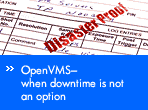HP OpenVMS Systems
OpenVMS Technical Journal V16
OpenVMS information
HP OpenVMS systems
Evolving business value
Related Links
Open Source Tools - Ported to HP OpenVMS
The Open Source Tools on this page provided by HP and our contributors are free software without any warranty or support from HP.
For open source products ported to OpenVMS and supported by HP or our partners, including
GNV for OpenVMS ›, see Application Modernization and Integration Technology. ›
Open Source Tools Provided by HP
Open Source Tools Provided by our Contributors
Freeware Distribution
The Freeware Distribution contains "public domain" and "freeware" software which runs on OpenVMS. The purpose of the OpenVMS Freeware Distribution is to provide OpenVMS customers with easy access to public domain software and "free" internal HP software and tools.
Freeware Distribution › (August 2010)
GTK+
GTK+ is an open source, free software library for creating graphical user interfaces.
GTK+ for OpenVMS Alpha ›
libIDL
The IDL Compiling Library (libIDL) for OpenVMS Alpha is an open source, free software library used for creating trees of CORBA Interface Definition Language (IDL) files. libIDL is part of the GNOME library set. gnu
While libIDL is general purpose, libIDL was ported to OpenVMS to facilitate the building of Mozilla on OpenVMS and has only been used for this purpose.
More information about libIDL is available from http://andrewtv.org/libIDL/index.jsp.
libIDL for OpenVMS Alpha ›
Majordomo Internet Mail Handler
Majordomo automates the management of Internet mailing lists. Commands are sent to Majordomo via electronic mail to handle all aspects of list maintenance. Once a list is set up, virtually all operations can be performed remotely, requiring no intervention upon the postmaster of the list site.
SNORT® for OpenVMS
Snort for OpenVMS is based on Open Source version of SNORT®.
Snort for OpenVMS is a network intrusion detection software, capable of performing real-time traffic analysis, alerting network intrusions and packet logging on IP networks. It utilizes a combination of protocol analysis and pattern matching to detect anomalies, misuse and attacks.
Snort® uses a flexible rules language to describe activity that can be considered malicious or anomalous. Snort also has an analysis engine that incorporates a modular plug-in architecture.
For more information about Snort®, see http://www.snort.org/
For more information about Snort for OpenVMS see: http://h71000.www7.hp.com/openvms/products/snort/
Download Snort V2.8-531 for OpenVMS Integrity servers (August 2010)
Download Snort Version 2.8-531 for OpenVMS Integrity servers Source Code Kit (August 2010)
SNORT is a registered trademark of Sourcefire, Inc.
Stunnel
Stunnel allows you to encrypt arbitrary TCP/IP connections inside an SSL (Secure Sockets Layer) connection from your OpenVMS system to another machine. Stunnel allows you to secure non-SSL aware applications (such as Telnet, IMAP, RCP, and FTP authentication) by having Stunnel provide the encryption, so you do not have to change the original application. Both images and source code are provided. For more information about Stunnel, see http://www.stunnel.org.
Stunnel compatible with HPE SSL1 V1.0 (based on OpenSSL 1.0.2 stream)
STUNNEL-4_20_AXP.ZIPEXE ! for Alpha (Updated December 2015)
STUNNEL-4_20_I64.ZIPEXE ! for Integrity servers (Updated December 2015)
See STUNNEL_README_AXP_I64.TXT (for Alpha and Integrity servers)
Download Stunnel for Alpha › (February 2016)
Download Stunnel for Integrity servers › (February 2016)
The Stunnel kit is a compressed, self-extracting EXE file. To expand the Stunnel source kit, enter one of the following commands:
$ RUN STUNNEL-4_20_AXP.EXE ! for Alpha (Updated September 2007)
$ RUN STUNNEL-4_20_I64.EXE ! for Integrity servers (Updated September 2007)
$ RUN STUNNEL-3_26_VAX.EXE ! for VAX
At the Decompress into (file specification): prompt, press return. The system expands the file and names the decompressed file STUNNEL-4_20.BCK or STUNNEL-3_26.BCK.
See STUNNEL_README_AXP_I64.TXT (for Alpha and Integrity servers) or
STUNNEL_README_VAX.TXT (for VAX) for information about Stunnel on OpenVMS.
Download Stunnel for Alpha › (September 2007)
Download Stunnel for Integrity servers › (September 2007)
Download Stunnel for VAX › (November 2002)
GnuPG
GnuPg (GNU Privacy Guard) is GNU's tool for secure communication and data storage. It can be used to encrypt data and to create digital signatures. GnuPG includes an advanced key management facility.
See http://www.gnupg.org/ › for more information about GnuPG.
GnuPG is a complete and free replacement for PGP. Because it does not use the patented IDEA algorithm, it can be used without any restrictions. GnuPG is a RFC 2440 (OpenPGP) compliant application.
Download GnuPG for OpenVMS (With Sources) ›
Source code
Source code for the following Open Source products is provided.
Important Source code kits and build instructions are provided "as-is" and without any support from HP. The binaries resulting from a build from either modified or unmodified source code are unsupported. HP provides support, via OpenVMS software services contracts, only for HP supplied binaries.
CD Record
CD Record is a free software package used to provide support for writing Compact Disk media on OpenVMS. The Open Source CD Record capability is provided on the Open Source Tools CD.
The CD Record source kit is a compressed backup saveset. To expand the CD Record source kit, enter the following command:
$ RUN CDRECORD_SOURCES.EXE
At the Decompress into (file specification): prompt, press return. The system expands the file and names the decompressed file CDRECORD_SOURCES.BCK.
To restore the CD Record backup saveset, enter the following commands:
$ CREATE/DIR disk:[directory]
$ BACKUP CDRECORD_SOURCES.BCK/SAVE disk:[directory...]*.*
CDRECORD_README.TXT contains more information about CD Record on OpenVMS. ›
Download the CD Record Version 1.10 source code › (September 24, 2003)
CDSA (Common Data Security Architecture)
The Common Data Security Architecture (CDSA) is a multiplatform, industry-standard security infrastructure. CDSA is part of the OpenVMS Alpha and Integrity servers operating system.
For more information about CDSA on OpenVMS, see HP Open Source Security for OpenVMS, Volume 1: CDSA (HTML › or PDF ›).
Download the CDSA Version 2.4 source code) › (October 2010)
Kerberos
Kerberos Version 3.1 for HP OpenVMS › is based on MIT Kerberos V5 Release 1.4.1, including security patches. Kerberos Version 3.1 runs on OpenVMS Integrity servers Version 8.3 and higher and OpenVMS Alpha Version 7.3-2 and higher. (Version 2.0 runs on OpenVMS VAX Version 7.3 and higher.)
Kerberos is a network authentication protocol designed to provide strong authentication for client/server applications by using secret-key cryptography.
For more information about Kerberos on OpenVMS, see HP Open Source Security for OpenVMS, Volume 3: Kerberos (HTML › or PDF ›).
Download the Kerberos Version 3.1 source code › (November 2007) ›
HP SSL (Secure Sockets Layer)
HP SSL Version 1.4 for OpenVMS › is based on OpenSSL 0.9.8h and includes all of the atest security updates from OpenSSL.org.
SSL is the open standard security protocol for the secure transfer of sensitive information over the Internet. SSL provides privacy through encryption, server authentication, and message integrity. Client authentication is available as an optional function.
For more information about HP SSL for OpenVMS, see HP Open Source Security for OpenVMS, Volume 2: HP SSL (HTML › or PDF ›) or visit the HP SSL for OpenVMS web page ›.
Note: HP SSL V1.4 is not backward compatible with earlier versions of HP SSL. Please check the “Advisory for HP VMS SSL users on OpenVMS V8.4 for Integrity servers and Alpha platform” or visit the “HP SSL for OpenVMS web page” › for more information.
Download the HP SSL Version 1.4 source code › (May 2010)
Future directions of OpenVMS open source tools
HP is committed to protecting your privacy. Learn more. ›
Tell us what you think!
and tell us which open source products you would like to see part of future versions of OpenVMS.
Licensing
Unless otherwise licensed, these open source tools are provided as free software under the terms of the GNU Lesser General Public License. You can redistribute them and/or modify them under the terms of the GNU Lesser General Public License as published by the Free Software Foundation Version 2.1 of the License.
This library is distributed in the hope that it will be useful, but WITHOUT ANY WARRANTY; without even the implied warranty of MERCHANTABILITY or FITNESS FOR A PARTICULAR PURPOSE. See the GNU Lesser General Public License, located in the GNV kit directory, for more details.


